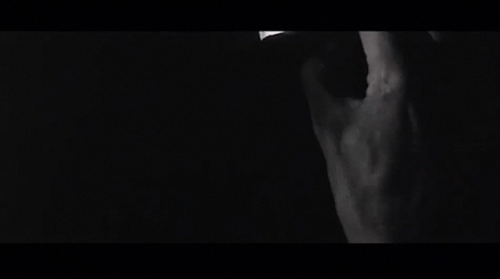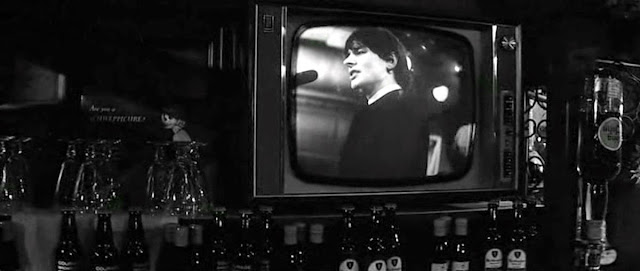 |
| "Bunny Lake is Missing" is an atmospheric, but ultimately unsatisfying suspense thriller. |
Bunny Lake is Missing is one of those flawed or fake—depending on your point of view—cinematic gems from the ‘60s, such as Marnie or Reflections in a Golden Eye. Or a rediscovered treasure, if you’re a revisionist. For me, while there’s much to recommend about Bunny Lake, the 1965 suspense film misses the mark.
Director
Otto Preminger was a master of creating cinematic mood, his strong suit here. Bunny Lake begins with Saul Bass’
strikingly simple titles, over Paul Glass’ melancholy score. The set-up is
powerfully simple: an American mother in London drops her four-year-old daughter
at school; upon her return, nobody there has actually seen Bunny. The big question becomes: Has Bunny gone bye-bye or is this
woman cray-cray?
 |
| Carol Lynley as the distraught mother and Keir Dullea is her supportive brother. |
The
leads are played by two perennial ingénues from the ‘60s. Carol Lynley, famed for
lip-synching “The Morning After” in hot pants in The Poseidon Adventure, is Ann Lake. Keir Dullea, famous for
dueling wits with Hal in 2001: A Space Odyssey
is her brother Steven. Two of England’s most revered theatrical greats support
the brother-sister act: Laurence Olivier is the detective determined to get at
the truth and Noel Coward plays Ann Lake’s nutty new landlord.
 |
| Latter day Laurence Olivier seems uncharacteristically subdued in 'Bunny Lake,' but who wouldn't compared to flamboyant Noel Coward? |
Once
the cops are called and the investigation begins, Bunny Lake deflates instead of escalates. Preminger, who had a
tendency toward the over-the-top showmanship, like stunt casting and
titillating stories, uses diversionary tactics here. Since the villain is
obvious and revealed early, there’s nowhere for the story to go. So, Preminger
takes Lynley’s character and audiences on a joy ride via several set pieces
that, while eerily effective, are a smokescreen for the lack of actual plot. Supporting
characters, who range from quirky to bizarre, offer atmosphere but are really
just red herrings.
First,
Ann Lake and her brother Steven find the founder of the school stashed away, living
on the third floor. She is played by Martita Hunt, memorable as Miss Havisham
in David Lean’s Great Expectations. Apparently,
Otto thought it would be an homage hoot to cast her as the dotty ex-school
teacher, rattling on about recording children’s dreams and nightmares.
Back
at home, Ann’s scenes with the lecherous landlord, an elderly poet crassly
putting the make on the distressed mother, feels like a badly told dirty joke.
 |
| Lynley as Ann Lake, looking for her daughter, and here, her doll. |
Bunny’s
belongings seem to have gone missing, too. To prove that Bunny is real, Ann
impulsively goes into downtown London on a busy night to retrieve a doll that’s
under repair. Her visit to the “doll hospital” is eerie—of course! The owner
appears to be out of his mind, and also electricity, since Ann is forced to
look for her doll with a kerosene lamp. How dramatic for the distraught mother,
to look for her doll among hundreds of others, by lamp light.
China
doll Lynley’s character ends up in a hospital herself and her escape is almost as
creepy as the doll’s rest home. These scenes all feel like detours, a delay to
an absurd showdown.
 |
| Saul Bass created many memorable opening credits, several for Otto Preminger films. |
What
makes Bunny Lake worth watching
despite its shortcomings is the talent involved. Husband and wife screenwriting
team John and Penelope Mortimer try hard to create suspense in a story where
even the source material was stumped for a plausible resolution. Aside from
Saul Bass’ brilliant titles and Paul Glass’ score, Denys N. Coop’s
cinematography captures not only the mood, but 1960s London beautifully. One of
Otto Preminger’s strengths as a director was his later preference for shooting entirely
on location, with as few sets as possible. I wonder what Alfred Hitchcock’s
more stylized storytelling, with his in-studio visual effects, would have made
of this story. Interestingly, Preminger moved ‘65’s Bunny Lake’s story from New York City to London and Hitchcock
transplanted ‘64’s Marnie from
England to East Coast America.
 |
| MAD magazine's parody of 'Bunny Lake is Missing' nails all of its nagging flaws. |
Bunny Lake is Missing
is another of those films that was a failure upon its release, but now has revisionist
fans and critics who claim it is an unappreciated masterpiece, much like Marnie. True, many films are
underappreciated in their time and just as many hit films of their era now seem
overrated. Movie-watching is a personal experience, but I read over-the-top
accolades for famously uneven films or infamously lackluster actors with amused
disbelief. I wonder if film historians/writers have been mining the same
celluloid territory for so long that there’s nothing new to write about.
Watching with rose-colored glasses, they try to convince everyone—and
themselves—that a movie lemon is actually a cool cinematic drink of lemonade.
Now,
I can appreciate a film’s virtues, even if the parts do not add up to a
satisfying whole. Despite being in perverse awe of its stupefying flaws, I am intrigued
by Hitchcock’s Marnie. John Huston’s Reflections in a Golden Eye and Joseph
Losey’s Secret Ceremony are two other
‘60s psychological dramas that while uneven, offer stunning visuals, strong
performances, and a fine sense of dread. However, I don’t mistake them for
unsung classics, but think that film “failures” can be just as fascinating as
cinema classics.
 |
| Carol Lynley and Keir Dullea: Lovely to look at, listless to watch. |
While
researching this film, I noticed that today’s champions of Bunny Lake is Missing are noticeably silent about the stars’
performances. Though bolstered by an excellent cast of British character
actors, the lead performances in Bunny
Lake range from bland to bananas. Carol and Keir, as sister and brother,
with their huge blue eyes and angelic features, are lovely to look at. But
their acting is wan, shallow, and a bit precious, which may be why neither
starlet sustained a noteworthy film career. Latter day Laurence Olivier is usually
pure ham, but here, Larry walks through this like a sleepwalker instead of a
sleuth. Noel Coward makes up for that, as the landlord, Wilson. Coward is so flamboyant
that he should be hitting on Keir, not Carol. Still, Noel hit on Dullea in his
own way, with his renowned wit. When asked about the actor in an interview,
Coward famously replied: “Keir Dullea, gone tomorrow!”
The
biggest mystery of this movie is why British pop group The Zombies got
co-starring billing when they only appear as themselves—on a pub television
set.
Bunny Lake is Missing
has atmosphere and A-team talent to spare—the only real thing missing is a
story.
 |
| Headscratcher: The Zombies get co-star credit for this appearance in 'Bunny Lake!' |



I bought this on dvd a few years ago, for a week of Otto Preminger films, I think, knowing nothing about it in advance, so it was quite a pleasant surprise. I thought it was great.
ReplyDeleteI bought this on dvd a few years ago, for a week of Otto Preminger films, I think, knowing nothing about it in advance, so it was quite a pleasant surprise. I thought it was great.
ReplyDeleteThere's certainly things that are fascinating about the film!
DeleteCheers, Rick
Oh this was a fun read. My attachment to this movie is purely visual. The graphics from the poster are really haunting. There was a framed poster in the workroom at a florist job I had once. When I finally saw the movie it was a bit of a let down but still liked it. Carol Lynley had such a deer in the headlights quality about her. Always a hoot to see Noel Coward in action. Odd film. "Marnie" has some really memorable moments but this one just makes me think of a poster.
ReplyDeleteI always remember my Mom being intrigued by this movie, when I was a kid! And I always wanted to watch the grownup movies!
DeleteCheers, Rick
Loved reading your take on this film (and love that doozy of a find with the Mad magazine panel). This was a movie I tried to watch as a kid-that title is pretty grabby-but found it too talky. When I saw it again MANY years later I was surprised how much i was actually intrigued by the mystery.
ReplyDeleteIt helped a lot that I didn't know much about it, but the near robotic Dullea and Lynley still give me the creeps in this. It's been a long time since I've seen this, but you've whetted my appetite for a revisit. Now, can't wait to get to your Written on the Wind piece!
It's well worth watching, but the stars and the story's pay off are disappointing. A shame, since it starts off so well...
DeleteI thought this movie was great until the moment she runs off to the doll hospital. The rest of the movie is terrible. Agree on Coward, but I thought Olivier's matter-of-fact policeman was intended, quite well.
ReplyDeleteHi Jonathan, this type of suspense movie is one of my favorite genres and I REALLY wanted to like it. It really does go downhill when she goes to the doll hospital... I'd really like to read the book sometime and compare. Thanks for writing! Rick
Delete